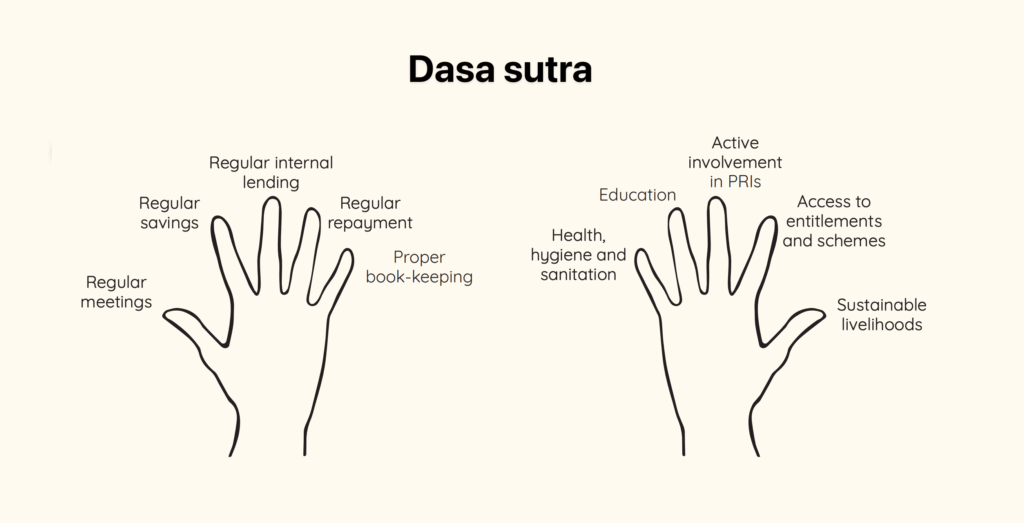Siadimal Village, a small village located in the remote pockets of Boipariguda Block, comes under Pendapada Gram Panchayat. It is surrounded by forest and agricultural farmlands. The village, though not well connected with the mainstream society, has witnessed the power of collectives and people’s conviction to fight against poverty.
Harsha Trust introduced its new initiative on the revival, formation and establishment of sustainable women self-help groups (WSHGs) and Federation in April 2017 at Boipariguda Block of Koraput District through a partnership approach in collaboration with OLM (Odisha Livelihoods Mission) and Mission Shakti. During our field-level survey and village-level concept-seeding meeting, we observed that most SHGs were formed and existed only for loan purposes but lacked clarity about Panchasutra, CLF and Future Visioning.
Firstly, we started intervention at the SHG level with different small training modules on the concept of SHG, the need for women to form SHGs, the importance of savings, internal lending and bookkeeping, the vision of each member and the meaning and need of Panchasutra. During our village-level concept seeding on “Why SHG?” we found many defaulter SHGs who have taken loans from the bank and defaulted due to poor utilisation of funds and lack of timely repayment.
Pancha sutra include –
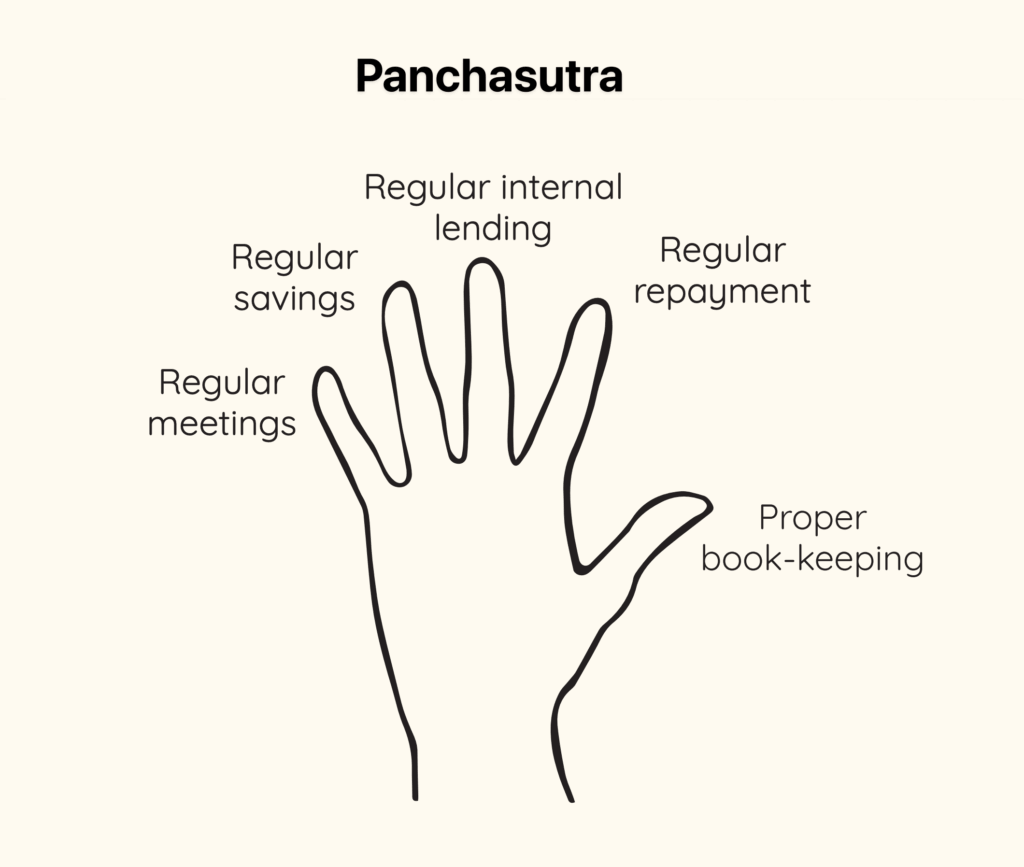
- Regular meetings
- Regular savings
- Regular internal lending
- Regular repayment
- Proper book-keeping
When Harsha Trust conducted the SHG concept-seeding Programme at Siadimal village, some members realised the gaps in the existing system and tried to visualise the losses they had incurred by making their institution defunct.
They arranged an SHG meeting on the same evening and decided to regularise their defunct SHG. They started collecting monthly savings and revolving it as internal lending among the members. During that period, awareness of other tools was conducted in the SHG, viz.- the concept of higher saving, BDP (Business Development Plan) for bank linkage, etc.
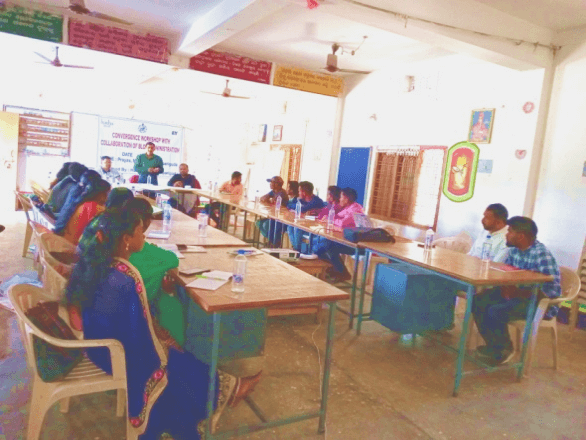
As their SHGs became regular, they formed a Cluster Level Forum (CLF) named ‘Gupteswar CLF’. Siadimal village consists of 48 households, and Bandakaguda village consists of 32 households of ST and OBC community. 6 SHGs and one Cluster Level Forum were formed in these two villages.
In June 2018, one SHG concept-seeding meeting was arranged at Kandlibeda AWC of Pendapada Panchayat, anchored by Harsha Trust. We had a detailed interaction with SHG leaders regarding their present situation and the challenges.
The SHG leaders recollected their past mistakes and the consequences they faced. In this meeting, Sabita Harijan, CRP (Cluster Resource Person) of the CLF, planned to arrange one village meeting to apprise the community about the benefits of an SHG and its vision. A three-month intensive capacity building through regular meetings and training was organised.
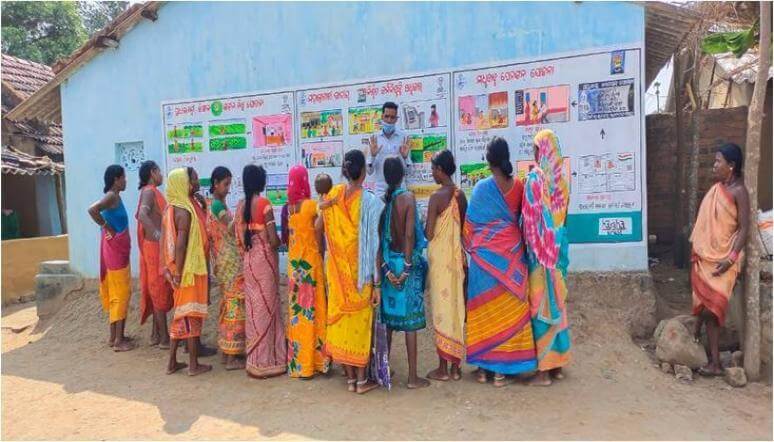
By September 2018, all the six SHGs of Siadimal and Bandakaguda Village followed the Panchasutra norms. A CLF was formed with proper representation from SHGs with some clarity and visioning of SHG. In the CLF Meetings, SHGs were regularly monitored on Panchasutra, and they audited all 6 SHGs of CLF and FPC. The SHGs paid ₹400/- as a Service Charge to Patneswari Farmer Producer Company Limited (PAPCL).
Gupteswar CLF was formed with 18 members, as three were nominated from each SHG. On the 5th of every month, they conducted monthly meetings and discussed their social and financial problems and derived solutions. They have designed different services. Leaders of CLF developed a good conceptual understanding and now have a robust vision for a bright future.
Gupteswar CLF has formed three sub-committees for looking after different aspects of the village, viz.- Financial Committee, Social Committee and Livelihood Committee. In Gram Sabha, the CLF members have put up their demands actively, and women’s participation has also increased. Every month, two meetings were conducted.
Social Committee of Gupteshwar CLF
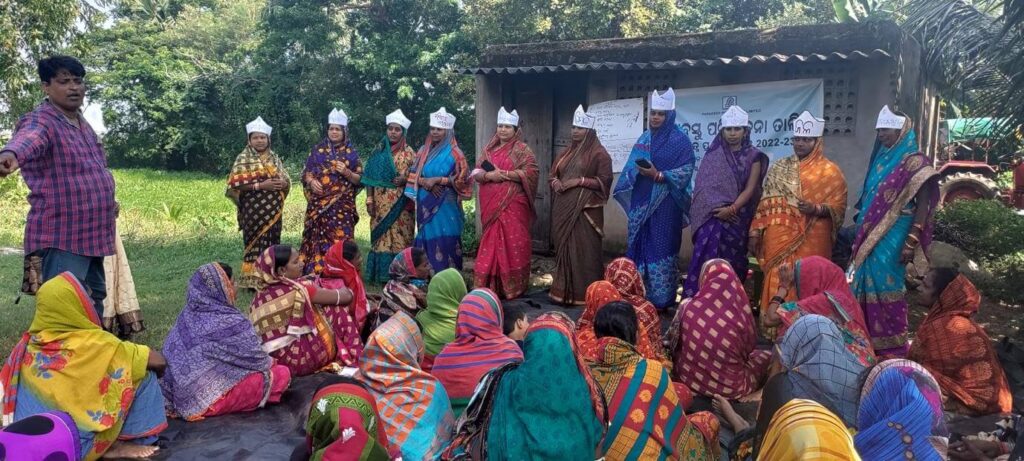
This is the most important committee which takes actions for -regularisation of Anganwadi Centre, maintaining the quality of food in Mid-Day-Meals, meeting Block officials and submitting grievances such as road connectivity, supply of drinking water, issue of 47 nos. of new job cards, availing 32 nos. of old age pension under Madhu Babu Pension Yojana and attending Gram Sabha at GP level in each year.
Women members’ cohesiveness and collective power bore fruitful results in that village. During the COVID-19 pandemic, Gupteswar CLF distributed cooked food to the ultra-poor families, managed the learning centre for children and also created awareness & facilitated vaccination work in those GPs.
Financial Committee
Similarly, these committee members regularised all 6 SHGs by updating records every month, motivating them for loan repayment and gradually increasing monthly savings. It ensured the audit, gradation and Credit plan of all 6 SHGs on time, which resulted in four SHGs receiving ₹ 2.8 lakh credit from Utkal Gramya Bank.
They try to ensure that all women members have a savings passbook in their name at the bank, and all input and output linkages are carried out through this passbook.
Livelihood Committee
The livelihood committee executed the following tasks,
- Formulating Individual Livelihood Plan of all members
- Drafting Credit needs plans for households
- 50 households received Agri input from the FPC outlet
- Vaccination of livestock
- Supported four ultra-poor families
- An advance deposit of ₹ 15,000 in FPC for input supply
- Share money of ₹ 48,000 deposited in FPC
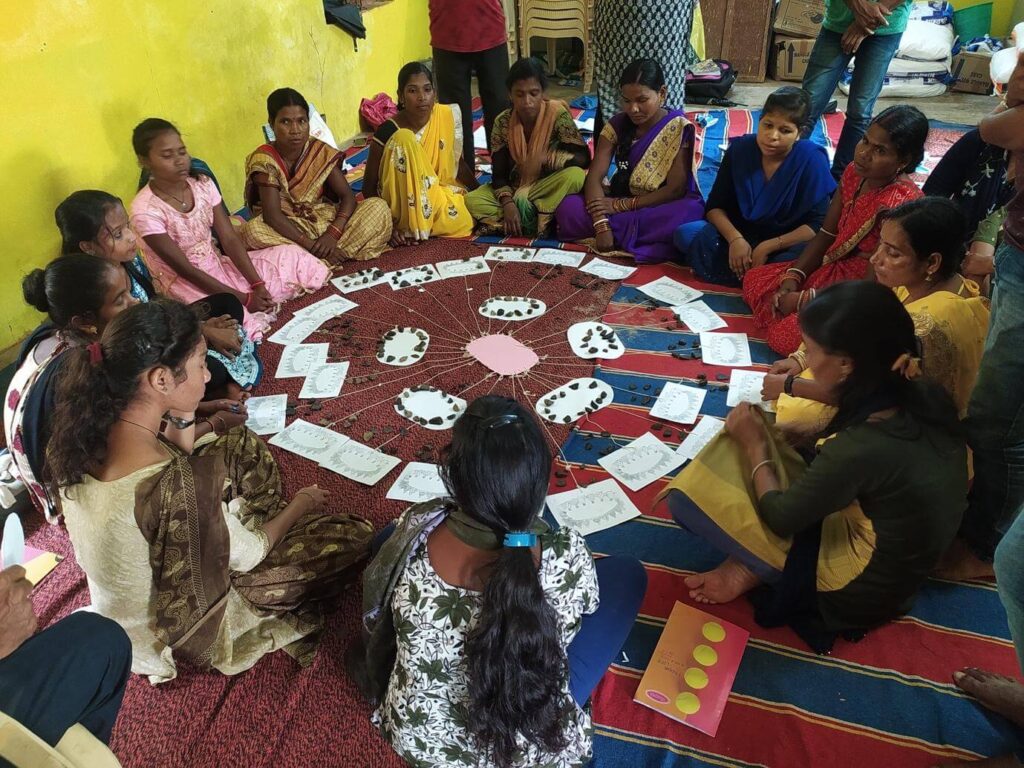
Fertiliser input was the most significant work done by the Finance Committee that links all the households to PAPCL FPC for maize, paddy and Kharif season. The intervention broke the traditional involvement of mediators pocketing their profits.
As part of the CLF, all SHGs can plan for their households and access the inputs from FPC and training on Agriculture and Livestock Management. To improve farming practices, Harsha Trust facilitators have given training on seed treatment nursery raising of paddy, ragi, maize and vegetables. They were not only given in-house training; the CRPs also demonstrated the practical aspects.
To enhance livestock production, the facilitators trained members on the importance of animals in the household economy, how the economy is degraded by our lack of awareness and how simple ways can be followed to restore our family economy. The best part of the training was that all the training was made very interesting for CLF Members and easily understood by all members because of the use of precise and visual tools specific to the local context.
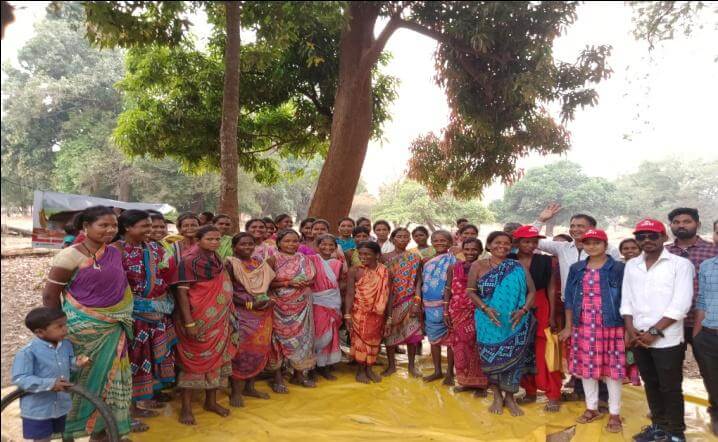
After knowing the importance of seed treatment, all the members treated their paddy and ragi seeds before sowing in the nursery. The members who used to sow the seeds in normal seed beds (paddy and Ragi) now sow them on raised beds.
All the goats and poultry birds have been covered by deworming in Bandakaguda and Siadimal Village. To ensure the routine vaccination schedule, the cost of the livestock medicines will be borne by CLF. Members purchase their inputs from Patneswari FPC and collectively sell outputs through FPC.
Impact
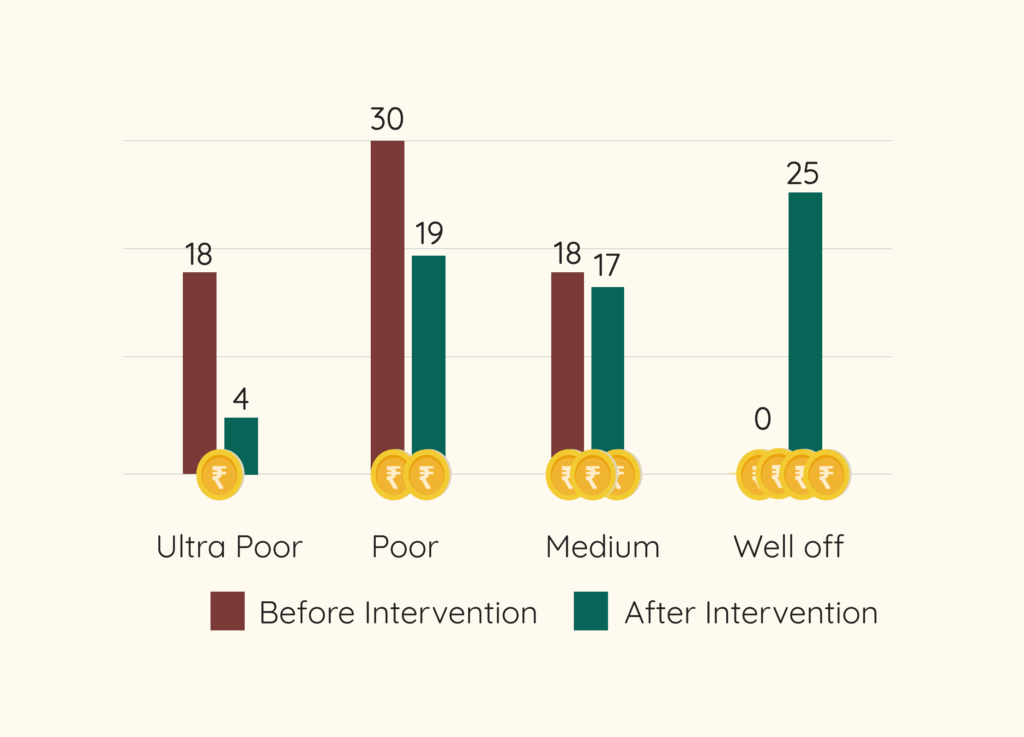
Income Analysis of Gupteswar CLF
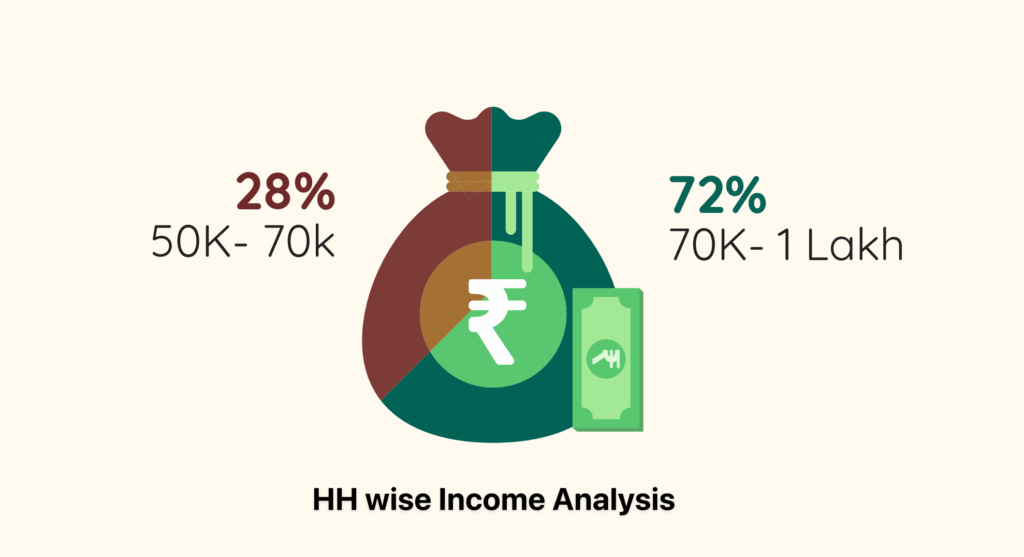
The hard work, active participation and support of FPC have brought a smile to the faces of many women members of Gupteswar CLF in that area. It helps them not only for income enhancement but also in improving their social status & recognition in their locality.
Going forward, we plan to orient the members of Gupteswar CLF on Dasa sutra to promote advocacy, awareness, and activities to ensure access to entitlements, better health, education, nutrition and sanitation practices in the community.
Dasa sutra includes —
Panchasutra (i)-(v) + (vi) Health, hygiene, and sanitation (vii) Education (viii) Active involvement in PRIs (ix) Access to entitlements and schemes (x) Sustainable livelihoods.
